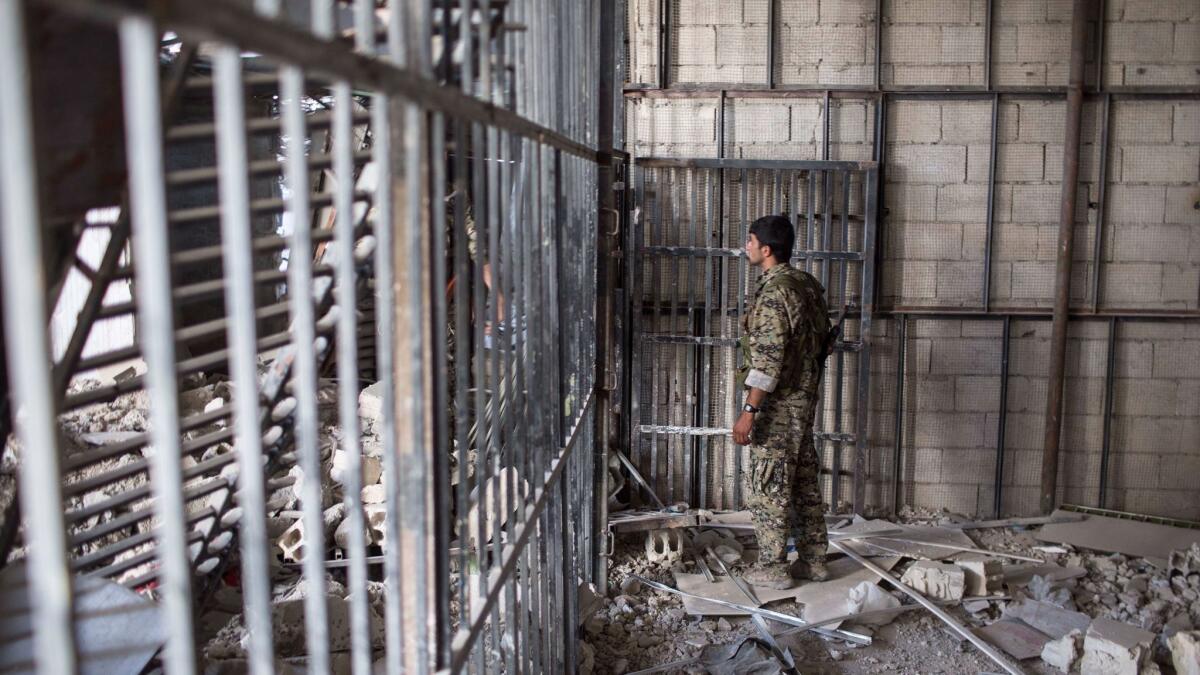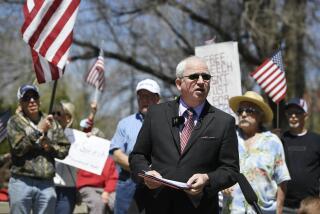U.S. citizen held after capture in Syria must be given a chance to talk to a lawyer, judge says

Reporting from Washington — A U.S. citizen being held without charges in Iraq must be allowed to meet with a lawyer to see if he wants to challenge his detention, a federal judge has ordered.
The man, who is accused of fighting for Islamic State, has been held as an enemy combatant by the military ever since he surrendered to a U.S.-backed militia in Syria in September.
The man hasn’t been charged with a crime, but the U.S. government has continued to detain him while officials try to decide how to handle his case.
In a ruling issued Saturday night, U.S. District Judge Tanya S. Chutkan ordered that the American Civil Liberties Union be given “immediate” access to the detainee, either in person or by teleconference, to see if he wants the ACLU or another lawyer to represent him. She also said the government could not monitor the conversation and barred the military from transferring the man to another country.
The New York Times reported last week that the man has both U.S. and Saudi citizenship and that Trump administration officials were discussing sending him to Saudi Arabia. In a filing, Justice Department lawyer Kathryn L. Wyer acknowledged that a transfer to another country is among the options under consideration.
The government argued in court that there was no evidence the man wanted the ACLU to represent him and said the law gives the military a “reasonable” period to decide the disposition of prisoners captured on the battlefield.
But the judge called that position “disingenuous at best,” since the man had already asked for a lawyer.
She said “the department’s position that his request should simply be ignored until it decides what to do with the detainee and when to allow him access to counsel is both remarkable and troubling.”
Jonathan Hafetz, a senior staff attorney for the ACLU, said “the ruling says immediate access, and that is what we will be demanding the government provide us.”
“This is a critical ruling that rejects the Trump administration’s unprecedented attempt to block an American citizen from challenging his executive imprisonment,” he said.
Wyn Hornbuckle, a Justice Department spokesman, said the government was reviewing the decision and had no further comment.
In recent years, the government has been using the federal criminal courts to handle captured terrorism suspects. But in this case, the government appears to have struggled to come up with evidence to file criminal charges. The man talked to intelligence officers, but a second interrogation, for law enforcement purposes, never began because the man asked to see a lawyer first.
When agents said they didn’t know when he could see a lawyer, the man replied “that it was OK, and that he is a patient man,” according to a government court filing.
The only other case of a U.S. citizen being held in military detention involved Yaser Hamdi, who was held at the U.S. naval base at Guantanamo Bay, Cuba, following his capture in Afghanistan. His case was resolved after Hamdi renounced his U.S. citizenship and was sent to Saudi Arabia. In that case, the Supreme Court ruled that such detainees must have access to U.S courts.
In this case, Justice Department lawyer Wyer, in her filing, said no one has been talking to the detainee about renouncing his U.S. citizenship.
Twitter: @jtanfani
More to Read
Get the L.A. Times Politics newsletter
Deeply reported insights into legislation, politics and policy from Sacramento, Washington and beyond. In your inbox three times per week.
You may occasionally receive promotional content from the Los Angeles Times.











